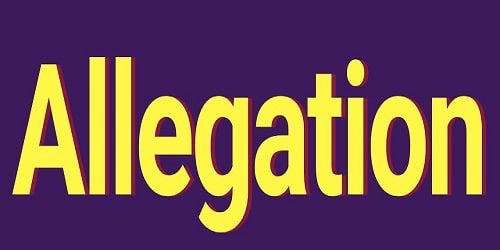Allegation Meaning
The word allegation derives in its etymology from the Latin word “Allegātus” and its meaning is that of a speech or exposition where arguments are put forward to favor or harm certain people or groups of them, in terms of their human quality or their actions, for example. example: “The students presented an allegation against their teacher because he does not explain in his classes and dresses indecently”, “the Nazi regime presented defamatory allegations about the Jews.” They can, therefore, be positive and in defense of values, or be used for lying and reprehensible preaching.
It can also be used to defend or oppose things or ideas, such as making an argument in defense of the environment, or in defense of public education, or against environmental pollution, or for or against abortion.
It is recommended that they be clear, precise, well-founded, and not too extensive, so that their purpose is not lost, focusing on the topic in question.
The pleadings are a means used in procedural legal practice so that the parties, based on the evidence provided, try to get the Judge to grant their claims (in the case of the plaintiff) or dismiss them (in the case of the defendant). Pleadings have been used since ancient Roman law, and continue to be used today to allow the parties to be heard.
After the arguments, the Judge would be in a position to issue a sentence, unless other previous steps correspond, such as the hearing of the representatives of the Public Ministry, if applicable. They are used in all types of trials, and their purpose is persuasive. Arguments may also be presented from the first instance ruling at the appeal level.
Allegation Meaning in Hindi
आरोप(Allegation) शब्द की उत्पत्ति लैटिन शब्द “एलेगेटस” से हुई है और इसका अर्थ है एक भाषण या व्याख्या जिसमें कुछ लोगों या उनके समूहों के पक्ष में या उनके मानवीय गुणों या उनके कार्यों के संदर्भ में उनके पक्ष में तर्क दिए जाते हैं, उदाहरण के लिए। उदाहरण: “छात्रों ने अपने शिक्षक के खिलाफ आरोप लगाया क्योंकि वह अपनी कक्षाओं में व्याख्या नहीं करता है और अभद्र तरीके से कपड़े पहनता है”, “नाजी शासन ने यहूदियों के बारे में अपमानजनक आरोप लगाए।” इसलिए, वे सकारात्मक और मूल्यों की रक्षा में हो सकते हैं, या झूठ बोलने और निंदनीय उपदेश देने के लिए इस्तेमाल किए जा सकते हैं।
इसका उपयोग चीजों या विचारों का बचाव या विरोध करने के लिए भी किया जा सकता है, जैसे पर्यावरण की रक्षा में, या सार्वजनिक शिक्षा की रक्षा में, या पर्यावरण प्रदूषण के खिलाफ, या गर्भपात के पक्ष में या खिलाफ तर्क देना।
यह अनुशंसा की जाती है कि वे स्पष्ट, सटीक, अच्छी तरह से स्थापित और बहुत व्यापक न हों, ताकि उनका उद्देश्य खो न जाए, और संबंधित विषय पर ध्यान केंद्रित करें।
दलीलें प्रक्रियात्मक कानूनी व्यवहार में इस्तेमाल किया जाने वाला एक साधन है, ताकि पक्षकार, उपलब्ध कराए गए साक्ष्य के आधार पर, न्यायाधीश से अपने दावों को स्वीकार करवाने (वादी के मामले में) या उन्हें खारिज करवाने (प्रतिवादी के मामले में) का प्रयास करें। दलीलों का इस्तेमाल प्राचीन रोमन कानून के समय से किया जाता रहा है, और आज भी पक्षों की सुनवाई के लिए इसका इस्तेमाल किया जाता है।
बहस के बाद, न्यायाधीश सजा सुनाने की स्थिति में होगा, जब तक कि अन्य पिछले कदम मेल न खाएं, जैसे कि सार्वजनिक मंत्रालय के प्रतिनिधियों की सुनवाई, यदि लागू हो। उनका इस्तेमाल सभी प्रकार के परीक्षणों में किया जाता है, और उनका उद्देश्य प्रेरक होता है। अपील स्तर पर पहले उदाहरण के फैसले से भी तर्क प्रस्तुत किए जा सकते हैं।
